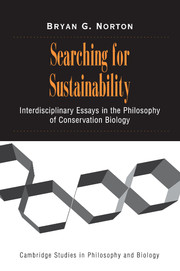Book contents
- Frontmatter
- Contents
- Searching for Sustainability
- General Introduction: An Interdisciplinary Experiment
- I PRAGMATISM AS AN ENVIRONMENTAL PHILOSOPHY
- II SCIENCE, POLICY, AND POLICY SCIENCE
- III ECONOMICS AND ENVIRONMENTAL SUSTAINABILITY
- IV SCALING SUSTAINABILITY: ECOLOGY AS IF HUMANS MATTERED
- V SOME ELEMENTS OF A PHILOSOPHY OF SUSTAINABLE LIVING
- VI VALUING SUSTAINABILITY: TOWARD A MORE COMPREHENSIVE APPROACH TO ENVIRONMENTAL EVALUATION
- Index
I - PRAGMATISM AS AN ENVIRONMENTAL PHILOSOPHY
Published online by Cambridge University Press: 21 January 2010
- Frontmatter
- Contents
- Searching for Sustainability
- General Introduction: An Interdisciplinary Experiment
- I PRAGMATISM AS AN ENVIRONMENTAL PHILOSOPHY
- II SCIENCE, POLICY, AND POLICY SCIENCE
- III ECONOMICS AND ENVIRONMENTAL SUSTAINABILITY
- IV SCALING SUSTAINABILITY: ECOLOGY AS IF HUMANS MATTERED
- V SOME ELEMENTS OF A PHILOSOPHY OF SUSTAINABLE LIVING
- VI VALUING SUSTAINABILITY: TOWARD A MORE COMPREHENSIVE APPROACH TO ENVIRONMENTAL EVALUATION
- Index
Summary
Intellectual histories, no less than histories of societies, are often shaped – and sometimes misshaped – by accidents of their birth. In my view, the discipline of environmental philosophy was in fact misshaped by a confluence of small accidents, beginning in 1967 with the provocative comment by the historian Lynn White, Jr., that our environmental crisis results from the “anthropocentric”nature of Christianity, the dominant religious tradition in the West. Then, when professional philosophers began asking, in the early 1970s, what philosophers could contribute to environmental thought and action, they responded to White's highly ambiguous, even offhand, statement with a particular analysis and a particular solution.
First, they interpreted White as having associated Christianity with a particular substantive theory about moral value, that all and only human individuals have “intrinsic/inherent value” and are morally considerable. Nonhuman organisms, on this interpretation of Christianity, are at best of “instrumental”value to the needs and whims of humans. Second, without considering other possible interpretations of White's comments, they responded with an alternative theory, which denies the anthropocentric theory by attributing intrinsic value and moral considerability to some nonhuman elements of nature. As a result, most philosophical discussion of environmental issues has centered on the question of whether natural objects other than humans have intrinsic or inherent value.
As noted in the General Introduction to this volume, I have adopted an experimental attitude, even toward philosophical ideas, and I gave the idea of intrinsic value of nonhumans a chance early in my career as an environmental policy advocate.
- Type
- Chapter
- Information
- Searching for SustainabilityInterdisciplinary Essays in the Philosophy of Conservation Biology, pp. 9 - 12Publisher: Cambridge University PressPrint publication year: 2002



